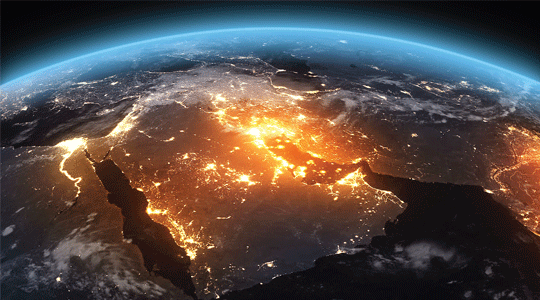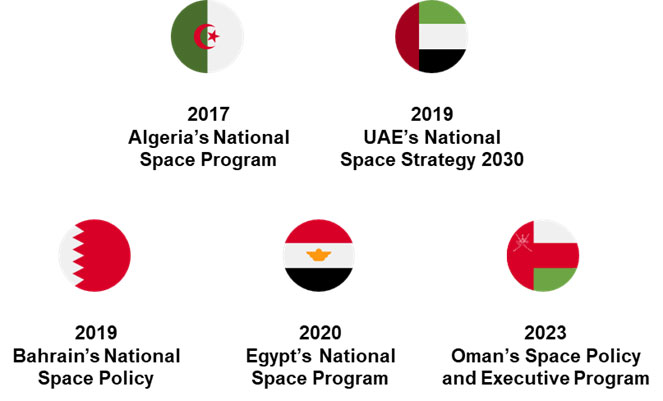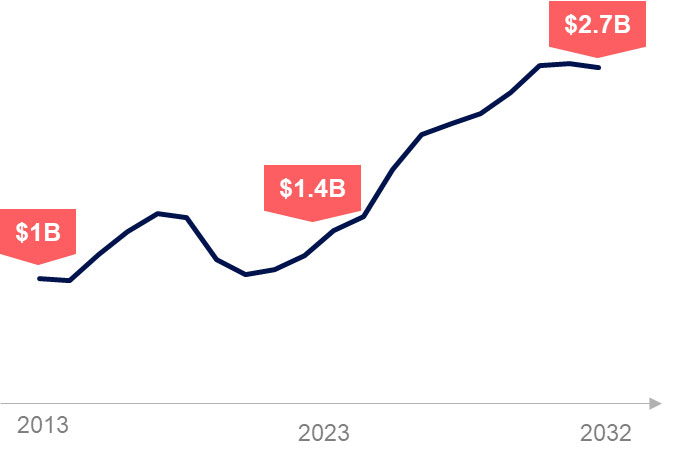
PARIS — Anticipated to reach more than $500 billion in 2023, the global space economy has undergone noteworthy growth in recent years. This surge is propelled by the economic transformation spurred by Newspace and the democratized access to increasingly cost-effective space technologies and services.
The swift economic growth within the space sector is drawing increasing attention from a diverse array of public and private entities eager to capitalize on its strategic and commercial prospects. The Middle East and North African (MENA) region is no exception to this trend.
Traditionally dependent on oil and gas revenues, MENA countries are currently undergoing substantial transformations and strategic initiatives to broaden their economic foundations and enhance their global presence. Given the potential economic and diplomatic advantages associated with space activities, investing in the sector has emerged as a pivotal component of this new strategy.
Revamped Space Ambitions in the MENA Region
The growth of the space sector in the Middle East and North Africa can be primarily attributed to government initiatives. In line with their national strategies and objectives, an increasing number of countries in the region have opted to overhaul their approach to the space sector in recent years.
This trend is evident in the rising number of countries in the region that are unveiling comprehensive and ambitious space policies, shaping the strategic direction for their local ecosystems. Noteworthy instances include the United Arab Emirates (UAE) in 2017, Bahrain in 2019, Egypt in 2020 and Oman in 2023.
Sample of recent space policies and strategies adopted in the MENA region
 (Source: Government Space Programs 23rd edition, Euroconsult)
(Source: Government Space Programs 23rd edition, Euroconsult)
This shift is also apparent from a strategic perspective. Historically, Middle Eastern countries primarily relied on satellite solutions as end-users, either utilizing third-party space assets or procuring national satellite systems from foreign suppliers to fulfill essential sovereign needs. To reduce dependence on external stakeholders and enhance local capabilities, countries in the region are now reevaluating their approach to the space sector. Their ambition is to localize space technologies and cultivate an advanced national space ecosystem capable of addressing domestic needs while also capitalizing on regional and global business opportunities.
Growing and Diversifying Public Investments
While historically, governments in the MENA region have directed their efforts toward civil activities and “traditional” space applications such as telecommunications and Earth observation, this shift in strategy and increased maturity is concurrently leading to a diversification of investments in the space sector.
Governments’ Space Expenditures In The MENA Region
 (Source: Government Space Programs 23rd edition, Euroconsult)
(Source: Government Space Programs 23rd edition, Euroconsult)
In 2023, over 60% of the space expenditures in the MENA region have been directed toward civil activities reaching $895 million this year. Of this figure, a significant portion is still allocated to telecommunications ($380 million) and Earth observation ($145 million) programs. Funds are indeed necessary to further replace aging satellites and launch cutting-edge capabilities, as exemplified by the Turkish Türksat program in the telecommunications sector and the UAE’s Sirb project in the Earth observation field.
In the meantime, MENA nations have increased their efforts in other areas. Notably, there is a growing focus on launch programs to facilitate space access as well as scientific missions. Within the science and exploration sector, public funds allocated to both crewed and uncrewed missions have surged by over 600% in the past decade, reaching nearly $110 million in 2023.
In recent years, MENA countries have achieved significant milestones in the space sector, comparable to those of historical space nations. For instance, the UAE successfully launched its first Mars mission, HOPE, in 2020 and is currently engaged in lunar projects. Regarding human spaceflight, while not all MENA countries possess crewed launch capabilities or training infrastructure, some have entered agreements with foreign partners to develop this capacity. For instance, Saudi Arabia sent two nationals to the International Space Station (ISS) through the U.S. company Axiom Space in 2023. Looking ahead, a Turkish national is set to join the ISS in 2024 using the same means.
Furthermore, there is a heightened commitment to fostering local skills and expertise. In 2023, the UAE demonstrated this trend by establishing the National Space Fund, designed to bolster national infrastructure and enhance manufacturing capabilities within the sector, backed by an investment exceeding $800 million.
Amid the global trend towards the militarization of the space sector, MENA nations are steadily escalating their defense budgets to reduce their dependence on other countries and develop strategic assets to defend themselves on the land, at sea and in the air.
From a mere $280 million in 2010, the region’s governmental investments in space defense have surged to over $500 million. Primary focuses of these investments include Earth Observation, supporting flagship programs like the Turkish Gokturk system, and Telecommunications. Looking ahead, government investments in space security assets are likely to increase to safeguard national interests, including satellites in orbit.
Considering these factors and already approved projects, government space expenditures in the MENA region are poised to accelerate in the coming years. Starting at $1.4 billion in 2023, total MENA public investments in the sector are projected to reach $2.7 billion by 2032.
Diversity Among Public Actors Funding Space Activities
The reevaluation of strategic goals has been coupled in some countries with a reassessment of the management structure for space endeavors. Nations like Saudi Arabia, Turkey and the UAE, aiming to broaden and diversify their space initiatives, have chosen to establish dedicated space agencies. Conversely, countries with more modest aspirations may opt to persist in developing their space industry through a specialized ministerial office, at least in the foreseeable future.
However, it would be inaccurate to assume that the funding of space activities in MENA nations solely relies on specialized ministries or space agencies. Governmental representatives and ministries from various sectors may contribute to the advancement of space activities aligned with their respective areas of expertise. For instance, the Ministry of Foreign Affairs in Iran and the Ministry of Defense in several countries may engage in space-related endeavors. While a dedicated Space Force or Space Command akin to those in the U.S. or Europe has not been established in the region, MENA nations are actively developing dual-use and defense space programs. This necessitates collaboration between defense and civil authorities, as exemplified by the Gorturk program in Turkey.
Beyond ministerial authorities, various national entities assume a vital role in shaping the local space ecosystem, including incubators and research and development (R&D) centers. Even with the establishment of a national space agency, the Mohamed Bin Rashid Space Center (MBRSC) in the UAE continues to be a central figure in the country’s space sector expansion. MBRSC is notably responsible for overseeing the development and operation of various flagship Earth observation programs, including DubaiSat, KhalifaSat, and MBZ-SAT. Additionally, the Space Center plays a crucial role in the advancement of exploration missions, as evidenced by the Mars HOPE mission. Moreover, MBRSC recently facilitated access for UAE astronauts to the International Space Station, underscoring its integral role in the nation’s space endeavors.
No comprehensive list of governmental funding stakeholders would be complete without acknowledging the substantial role played by sovereign wealth funds. These stakeholders have become instrumental catalysts in fostering diversification across the region, actively supporting technology-driven sectors like space. This is evident in the investments made by entities such as the Mubadala Investment Company in the UAE and the Saudi Public Investment Fund (PIF) both in local and foreign entities.
A Space Market Focused on Downstream Activities
Supported by governments, the MENA space sector market is swiftly evolving from a nascent stage to a notably more dynamic one.
Historically, the region has experienced relatively restricted engagement in the procurement and launch of space systems, and so in the upstream sector. Instead, it has emerged as a substantial user and developer of satellite-based solutions. Consequently, the market is predominantly defined by robust downstream revenues, accounting for 91% of the total value in the region’s space market estimated at $24.5 billion in 2023.
The downstream sector encompasses a diverse array of activities, including satellite operations, end-user terminals and primarily, services. For this reason, the service industry holds immense market potential in the years ahead. Despite the downstream sector taking the lead, the pursuit of national missions driven by considerations of sovereignty and commercial opportunities is triggering a significant upswing in satellite procurement programs. While approximately eight satellites were launched per year for MENA operators during the previous decade, this number is expected to increase to 23 during the current decade.
The current dynamism and burgeoning opportunities in the near-term future are drawing the attention of foreign commercial space entities from North America, Asia and Europe, all eager to stake a claim in the growing Middle East market. Yet, the MENA region’s space sector expansion hinges on overcoming challenges like skill and workforce development, alongside sustained governmental support for commercial space endeavors.
About the Author:
Charlotte Croison is a Senior Consultant working for Euroconsult’s consulting team in Washington D.C., leading and/or contributing to the analysis of governments’ space programs and policies, with a focus on legal aspects.
Explore More:
Podcast: The Opportunities, Challenges and Future of the Middle East Space Sector
Flurry of Partnerships Signal Arrival of Middle East as Major Space Player
How Regional Players Are Using Space to Strengthen Non-Space Sectors
University Spotlight: A Systems Engineering Approach for Emerging Space Actors
Podcast: Kacific CEO on Closing the Digital Divide in Asia-Pacific
